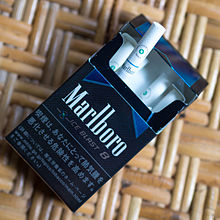
Menthol cigarette

A menthol cigarette is a cigarette infused with the compound menthol which imparts a “minty” flavor to the smoke. Menthol also decreases irritant sensations from nicotine by desensitizing receptors, making smoking feel less harsh compared to regular cigarettes. Some studies have suggested that they are more addictive.[1] Menthol cigarettes are just as hard to quit and are just as harmful as regular cigarettes.

Menthol cigarettes have been banned in several countries, including Canada, Ethiopia, European Union, Moldova, Turkey, the United Kingdom, and some areas of the United States, including California, the District of Columbia, and Massachusetts.

Origins and history

Menthol cigarettes were first developed by Lloyd "Spud" Hughes of Mingo Junction, Ohio, in 1924,[2] though the idea did not become popular until the Axton-Fisher Tobacco Co. acquired the patent in 1927, marketing them nationwide as "Spud Menthol Cooled Cigarettes". Spud brand menthol cigarettes became the fifth most popular brand in the US by 1932,[3] and it remained the only menthol cigarette on the market until the Brown & Williamson Tobacco Company created the Kool brand in 1933.

For over two decades, Kool was the only significant menthol cigarette brand in the United States, with a market share that never got much above 2%. Their advertisements focused on "throat comfort" and the "medicinal" properties of menthol, and some ads even suggested occasional use: "In between the others, rest your throat with Kools".[4]

R. J. Reynolds Tobacco Company launched the first menthol filter-tip cigarettes in 1956 under the Salem brand.[3] Less mentholated than Kool, Salem was positioned as an all-purpose cigarette, and captured 0.8% market share within its first year. Other tobacco producers, seeing the success of Salem, soon introduced their own mentholated filter cigarettes: Lorillard with Newport in 1957 and Spring in 1959; Philip Morris with Alpine in 1959; and Brown & Williamson with Belair in 1960.[4]

Design and manufacture

Menthol cigarettes are constructed similarly to non-mentholated cigarettes, with menthol added at any of several stages during the manufacturing process. Menthol may be derived from distilled corn mint oil, or produced synthetically.[5] While trace amounts of menthol may be added to non-mentholated cigarettes for flavor or other reasons, a menthol cigarette typically has at least 0.3% menthol content by weight. Lower-tar menthol cigarettes may have menthol levels up to 2%, in order to keep menthol delivery constant despite the filtration and ventilation designs used to reduce tar.[5]

A recent innovation has been to include a small capsule in or near the filter which can be broken to release additional menthol or other flavoring solutions. During the smoking of a cigarette the menthol delivery depletes noticeably, but this technology allows the smoker to increase the menthol delivery at a chosen point to sustain or enhance the menthol 'feel'. The capsules can contain any flavorings, but are primarily menthol.[6]

Compared to tobacco blends for non-mentholated cigarettes, a menthol cigarette will tend to have more flue-cured than burley tobacco, and less oriental tobacco.[5]

Use and popularity
Menthol cigarette usage varies widely by country. They are most popular in the Philippines, where they account for over 60% of total cigarette sales.[7]

United States

Historian Keith Wailoo argues the cigarette industry targeted a new market in the black audience starting in the 1960s. It took advantage of several converging trends. First was the increased national attention on the dangers of lung cancer. Cigarette companies responded by developing menthol-flavored brands like Kool, which seemed to be more soothing to the throat, and advertised these as being more healthy. A second trend was the Federal ban on tobacco advertising on radio and television; as there was no ban on advertising in the print media, the industry responded with large scale advertising in Black newspapers, magazines as well as billboards in inner city neighborhoods. The third trend was the Civil rights movement of the 1960s. Big Tobacco invested heavily in the Civil Rights Movement, winning the gratitude of many national and local leaders. Menthol flavored cigarette brands sponsored local events in the black community, and subsidized major black organizations including the NAACP (National Association for the Advancement of Colored People) in addition to many churches and schools. The marketing initiative was a success as the rate of smoking in the black community grew, especially for menthols, while it declined among whites.[8]

In the United States, menthols comprise about 30% of the total cigarette market.[9] Menthol cigarettes are purchased disproportionately by African-American smokers, with 80% of African-American smokers consuming menthol cigarettes primarily.[10][11][12] In fact, menthol tobacco marketing is specifically targeted to African Americans;[13] it is a subject of research and it has been a subject of litigation on discrimination grounds. The proportion of smokers who use menthols rose from 31% in 2004 to 33.7% in 2010, according to a 2010 study by the Substance Abuse and Mental Health Services Administration. Much of the increase comes from young people.[14]

Racial marketing strategies changed among American tobacco companies during the 1950s. The civil rights movement led to the rise of African-American publications, such as Ebony. This helped tobacco companies to target separate marketing messages by race.[15] Tobacco companies supported civil rights organizations, and advertised their support heavily. Industry motives were, according to their public statements, to support civil rights causes; according to an independent review of internal tobacco industry documents, they were "to increase African American tobacco use, to use African Americans as a frontline force to defend industry policy positions, and to defuse tobacco control efforts". There had been internal resistance to tobacco sponsorship, and some organizations later began rejecting nicotine funding as a matter of policy.[16]

Race-specific advertising exacerbated small (a few percent) racial differences in menthol cigarette preferences into large (tens of percent) ones.[17] It has been proposed that menthol cigarettes, which are more addictive but no less harmful,[13][18] should be banned, partially on grounds that race-specific marketing for a more addictive product is a social injustice.[19]

Despite it being illegal at the time, tobacco marketers gave out free menthol cigarette samples to children in black neighborhoods in the U.S.[20][21] Similar practices continue in Sub-Saharan Africa, where a 2016 study found over 12% of South African students had been given free cigarettes by tobacco company representatives.[22]

In addition to high use by African Americans, menthol cigarettes are used disproportionately by adolescents, women, and lesbian, gay, bisexual, and transgender (LGBT) Americans.[23] Americans identifying as LGBT are twice as likely to use menthol cigarettes, according to CDC research.[24] Where these demographics overlap, menthol use is especially high: most female LGBT smokers use menthols, as do 80% of African American youth smokers and 70% of LGBT youth smokers.[25] Tobacco companies have targeted the LGBT community with advertising for menthol cigarettes, most notably through Project SCUM.[25]

A Federal Trade Commission report released September 21, 2012, said menthol cigarettes sales had gone from 27% in 2008 to 22% in 2010.[26]

Regulation
Several places have banned menthol cigarettes, including Brazil, Canada, Ethiopia, Turkey, Moldova, the European Union and the United Kingdom.[27]

Canada
Canada imposed a nationwide ban on menthol cigarettes that took effect on 1 October 2017.[28] But several provinces had already banned it before at the provincial level, for example Quebec, Alberta, Nova Scotia, Ontario and New Brunswick.

Brazil
In March 2012, Brazil became the first country to outlaw flavored cigarettes including menthol cigarettes,[29] but was unable to enact it due to the tobacco industry interference resulting in a lengthy court battle. Philip Morris Brasil (PMB) had challenged the ban through its membership of The National Industry Confederation, arguing that the ban was unconstitutional. According to Philip Morris International's 2018 annual report, "The tobacco union requested a stay of the enforcement of the ingredient ban while the appeal is pending". The Brazilian government finally won the court case in February 2018.

European Union and United Kingdom
On 21 June 2013, EU health ministers agreed on a directive to ban menthol cigarettes (technically "dual flavour cigarettes").[30] In response, the former German chancellor Helmut Schmidt (1918–2015) was reported to have hoarded 200 cartons of his preferred menthol cigarette brand in his house.[31]

On 20 May 2020, menthol cigarettes were banned in all European Union countries. Despite having left the EU in January 2020, the United Kingdom also enacted the ban.[32]

The EU menthol cigarettes ban was effective in increasing quit attempts and quitting among pre-ban menthol smokers.[33]

United States
Proposed ban in the United States
Although the use of menthol in ointments and cough drops is regulated by the Food and Drug Administration (FDA) in the United States of America, regulation of cigarettes was ruled to be outside their existing purview in 2000 by the Supreme Court in the 5–4 decision FDA v. Brown & Williamson Tobacco Corp.[34] This power was explicitly granted to the FDA by the 2009 Family Smoking Prevention and Tobacco Control Act, which also outright banned flavors in cigarettes other than menthol.

On March 18, 2011, the Tobacco Products Scientific Advisory Committee (an advisory panel to the FDA) concluded that removing menthol cigarettes from the market would benefit public health in the United States, but stopped short of recommending that the FDA take any specific actions, like restricting or banning the additive.[35] In response, the tobacco industry released a report to the FDA in an effort to change the focus of the subject by claiming menthol cigarettes are no riskier than regular cigarettes and should not be regulated differently.[36]

A progress report on panel findings was expected from the FDA in July 2011.[35]

The doctors' group African American Tobacco Control Leadership Council continued to support the ban.[19][37]

In November 2018 the FDA announced its intention to outlaw menthol cigarettes, later changing this position to advocate for restriction of flavored tobacco and e-cigarettes to a separate age-restricted room. The FDA stated that this change in position was due to their belief that they do not have the legal regulatory authority to unilaterally declare a ban, citing concerns that any such ban would result in litigation that the FDA would lose.[38]

In June 2020, two US NGOs (African American Tobacco Control Leadership Council and Action on Smoking and Health) filed a lawsuit against the FDA to try to force it to introduce a ban on menthol cigarettes in order to reduce health inequalities, noting that 85% of African American smokers smoke menthol cigarettes.[39]

In April 2021, the FDA announced that it planned to ban the sale, manufacturing, and importation of menthol cigarettes and mass-produced flavored cigars, citing menthol’s highly addictive qualities and the racial disparities among those most likely to smoke menthol cigarettes.[40][41] Proposed regulations were published for public comment in April 2022.[42][43] The attempt was postponed indefinitely after negative public feedback, with particular controversy generated on both sides by the disproportionate use by African-Americans.[44]

The Congressional Black Caucus issued a letter in support of a menthol cigarettes ban and opposed its postponement by the Biden administration.[45][46] The NAACP (National Association for the Advancement of Colored People) condemned the administration's postponement of the menthol cigarettes ban, stating "The NAACP is outraged and disgusted, but we refuse to be deterred. We will continue to do whatever it takes to protect and advance Black life. This is what standing for community looks like."[47]. The American Medical Association (AMA) also protested the postponement and joined a lawsuit intending to force the FDA to implement the ban.[48]

Opposition to proposed ban
Several black advocacy groups have voiced opposition to a proposed ban on menthol in cigarettes. The Congress of Racial Equality, the National Black Chamber of Commerce, the National Organization of Black Law Enforcement Executives, National Action Network, and the National Black Police Association have urged the FDA to reject a ban on mentholated cigarettes due to concerns that banning mentholated cigarettes could spur an illicit market for the outlawed products in minority communities.[49][50][51] Many of these organizations have received funding from major tobacco companies, raising conflict of interest concerns.[43]

Groups representing law enforcement officers also oppose the ban. The Law Enforcement Alliance of America and the National Troopers Coalition have urged the FDA to consider the impact a ban on menthol cigarettes would have on tobacco smuggling.[52]

The proposed menthol ban also saw opposition from organized labor. In December 2010, workers from the Bakery, Confectionery, Tobacco Workers and Grain Millers' International Union protested outside a meeting between FDA officials and industry representatives in Raleigh, North Carolina, arguing that a menthol ban would cost many workers their jobs.[53]

Additionally, the National Association of Convenience Stores opposes the ban based on menthol cigarettes accounting for 4% of their sales.[54] In a November 2023 letter to Joe Biden, they claimed that their members made $23.7 billion in sales on menthol cigarettes and flavored cigars and another $10.7 billion in non-tobacco sales among these smoking customers during 2022.[55]

A 2020 US Surgeon General Report, Smoking Cessation, concluded that there is not enough evidence to support banning menthol as a way to reduce smoking.[56]

Health impact
Menthol cigarettes are not healthier than other cigarettes.[18] The risk of lung cancer is no different for menthol cigarettes compared to regular cigarettes.[57] Some studies have suggested that they are more addictive.[58][59]

Young people who use menthol cigarettes are also thought to be 80% more likely to become life-long smokers than those who use regular cigarettes.[60]

Menthol decreases irritant sensations from nicotine by desensitizing receptors, making smoking less harsh.[60]

Menthol cigarettes have been shown to inhibit nicotine metabolization, leading to increased systemic nicotine exposure and increased nicotine addiction.[60][61]

See also
References
- ^ "The Science Behind the Addictiveness of Menthol". American Lung Organization. 2022-09-23. Retrieved 2024-10-15.
- ^ "Process of Treating Cigarette Tobacco". United States Patent Office.
US 1555580, Hughs, Lloyd F, "Process of Treating Cigarette Tobacco", issued September 29, 1925 - ^ a b McNichol, Tom (25 March 2011). "Mint that Kills: The Curious Life of Menthol Cigarettes". The Atlantic. Retrieved 18 July 2011.
- ^ a b Market Science Associates. "The Growth of Menthols: 1933–1977". Truth Tobacco Industry Documents.
- ^ a b c Ogden, Michael W (July 15, 2010). "Characterization of Menthol: History and Design of Menthol Cigarettes" (PDF). Food and Drug Administration (Slide presentation.). RJ Reynolds. Archived from the original (PDF) on May 16, 2012. Retrieved 11 April 2013.
- ^ "Menthol Capsules in Cigarette Filters - Increasing the Attractiveness of a Harmful Product" (PDF). Tobacco Prevention and Tobacco Control. German Cancer Research Center, Heidelberg. 2012.
- ^ Giovino, G.A.; Sidney, S; Gfroerer, J.C.; O'Malley, P.M.; Allen, J.A.; Richter, P.A.; Cummings, KM (February 2004). "Epidemiology of Menthol Cigarette Use". Nicotine & Tobacco Research. 6 (Suppl 1): S67–81. doi:10.1080/14622203710001649696. PMID 14982710.
- ^ Wailoo, Keith (2021-11-02). Pushing Cool. Chicago London: University of Chicago Press. ISBN 978-0-226-79413-6.
- ^ "Lorillard, Inc 2012 Form 10-K, p. 40". U.S. Securities and Exchange Commission. Retrieved 8 April 2013.
- ^ Gardiner, Phillip S. (February 2004). Munafò, Marcus (ed.). "The African Americanization of menthol cigarette use in the United States" (PDF). Nicotine & Tobacco Research. 6 (Suppl 1). Oxford University Press on behalf of the Society for Research on Nicotine and Tobacco: 55–65. doi:10.1080/14622200310001649478. eISSN 1469-994X. ISSN 1462-2203. LCCN 00244999. PMID 14982709. S2CID 1486105. Archived (PDF) from the original on 1 May 2021. Retrieved 7 January 2022.
- ^ Rubin, Rita (2009-09-27). "Exclusion of menthol cigarettes in ban worries health experts". USA Today. Retrieved 2010-05-12.
- ^ "Harvard Researchers Gather More Evidence Implicating Menthol in Health Disparities Between White and Black Smokers". Harvard School of Public Health. August 18, 2005.
- ^ a b Cohn, Amy M.; Alexander, Adam C.; Ehlke, Sarah J. (August 2021). Munafò, Marcus (ed.). "Affirming the Abuse Liability and Addiction Potential of Menthol: Differences in Subjective Appeal to Smoking Menthol Versus Non-Menthol Cigarettes Across African American and White Young Adult Smokers". Nicotine & Tobacco Research. ntab137 (1). Oxford University Press on behalf of the Society for Research on Nicotine and Tobacco: 20–27. doi:10.1093/ntr/ntab137. eISSN 1469-994X. ISSN 1462-2203. LCCN 00244999. PMC 8666118. PMID 34405884. S2CID 237197350.
- ^ "National Survey on Drug Use and Health". Substance Abuse and Mental Health Services Administration. November 18, 2011.
- ^ Davis, Ronald M.; Gilpin, Elizabeth A.; Loken, Barbara; Viswanath, K.; Wakefield, Melanie A. (2008). The role of the media in promoting and reducing tobacco use (PDF). National Cancer Institute tobacco control monograph series. U.S. Department of Health and Human Services, National Institutes of Health, National Cancer Institute. p. 684.
- ^ Yerger, V. B.; Malone, R. E. (2002-12-01). "African American leadership groups: smoking with the enemy". Tobacco Control. 11 (4): 336–345. doi:10.1136/tc.11.4.336. PMC 1747674. PMID 12432159.
- ^ Edwards, Jim (January 5, 2011). "Why Big Tobacco Targeted Blacks With Ads for Menthol Cigarettes". CBS News. Retrieved 2018-05-24.
- ^ a b Tobacco Products Scientific Advisory Committee (TPSAC) of the Center for Tobacco Products of the Food and Drug Administration (FDA) (2011-07-21). Menthol Cigarettes and Public Health: Review of the Scientific Evidence and Recommendations (PDF). US Food and Drug Administration. p. 252. Archived from the original (PDF) on 2017-05-17. Retrieved 2018-05-24.
- ^ a b Tavernise, Sabrina (2016-09-13). "Black Health Experts Renew Fight Against Menthol Cigarettes". The New York Times. Retrieved 2018-05-24.
- ^ "Cigarette Suit Says Maker Gave Samples To Children". The New York Times. Associated Press. 2004-06-27. Retrieved 2018-05-24.
- ^ "Evans v. Lorillard: A Bittersweet Victory Against the Tobacco Industry" (PDF). Tobacco Control Legal Consortium. Mitchell Hamline School of Law. August 2016. Retrieved 20 December 2018.
- ^ Chandora, Rachna; Song, Yang; Chaussard, Martine; Palipudi, Krishna Mohan; Lee, Kyung Ah; Ramanandraibe, Nivo; Asma, Samira; GYTS collaborative group (October 2016). "Youth access to cigarettes in six sub-Saharan African countries". Preventive Medicine. 91S: –23–S27. doi:10.1016/j.ypmed.2016.01.018. PMID 26845374.
- ^ Rose, Shyanika W; Jo, Catherine L; Binns, Steven; Buenger, Melissa; Emery, Sherry; Ribisl, Kurt M (2017-02-27). "Perceptions of Menthol Cigarettes Among Twitter Users: Content and Sentiment Analysis". Journal of Medical Internet Research. 19 (2): e56. doi:10.2196/jmir.5694. ISSN 1439-4456. PMC 5348619. PMID 28242592.
- ^ Fallin, Amanda; Goodin, Amie J.; King, Brian A. (January 2015). "Menthol Cigarette Smoking among Lesbian, Gay, Bisexual, and Transgender Adults". American Journal of Preventive Medicine. 48 (1): 93–97. doi:10.1016/j.amepre.2014.07.044. ISSN 0749-3797. PMC 4454462. PMID 25245795.
- ^ a b Moodie-Mills, Aisha (May 12, 2011). "Flavored Disease and Death for Minorities". Center for American Progress. Retrieved 4 October 2018.
- ^ Craver, Richard (2012-09-25). "Reynolds to offer more menthol versions of Pall Mall cigarettes". Winston-Salem Journal.
- ^ Menthol Cigarettes: Tobacco Industry Interests and Interference.
- ^ "Ottawa finalizes ban on menthol cigarettes, other tobacco products". Global News. Retrieved 2021-06-01.
- ^ "Brazil bans flavored tobacco". WHO Framework Convention on Tobacco Control.
- ^ "EU agrees ban on menthol cigarettes". RTÉ. 21 June 2013.
- ^ "Ex-Chancellor 'hoards 38,000 cigarettes'". The Local. 9 July 2013. Archived from the original on 2013-07-11.
- ^ Gretler, Corinne (2020-02-05). "Europe's Menthol Ban Has Tobacco Firms Thinking Outside the Pack". Bloomberg.com. Archived from the original on 2020-03-20.
- ^ Kyriakos, Christina N; Driezen, Pete; Fong, Geoffrey; Chung-Hall, Janet; Hyland, Andrew; Geboers, Cloé; Quah, Anne C K; Willemsen, Marc C; Filippidis, Filippos T (2024-04-19). "Impact of the European Union's menthol cigarette ban on smoking cessation outcomes: longitudinal findings from the 2020–2021 ITC Netherlands Surveys". Tobacco Control. 33 (3): 302–309. doi:10.1136/tc-2022-057428. ISSN 0964-4563. PMC 11041602. PMID 36163172.
- ^ "FDA V. Brown & Williamson Tobacco Corp. (98-1152)". United States Supreme Court.
- ^ a b Wilson, Duff (18 March 2011). "Advisory Panel Urges F.D.A to Re-examine Menthol in Cigarettes". The New York Times.
- ^ "Tobacco Makers Fight Menthol Rules". Associated Press. 18 March 2011. Archived from the original on 27 April 2012.
- ^ Kenney, Tanasia (2016-09-19). "Why These Black Doctors Are Pushing President Obama to Ban Menthol Cigarettes, Tobacco Products". Atlanta Black Star. Retrieved 2018-05-24.
- ^ Kaplan, Sheila; Hoffman, Jan (2018-11-16). "F.D.A. Seeks Restrictions on Teens' Access to Flavored E-Cigarettes and a Ban on Menthol Cigarettes". The New York Times. ISSN 0362-4331. Retrieved 2018-12-20.
- ^ The Time is Now for the FDA to Ban Menthol in Commercial Cigarettes
- ^ Kaplan, Sheila (2021-04-29). "F.D.A. Announces Plan to Ban Menthol Cigarettes and Flavored Cigars". The New York Times. ISSN 0362-4331. Retrieved 2021-04-30.
- ^ "More than a million smokers likely to quit after U.S. bans menthol cigarettes". EurekAlert!. Retrieved 2022-06-01.
- ^ "The FDA is proposing a ban on menthol cigarettes". NPR. Archived from the original on 2023-04-18.
- ^ a b Jewett, Christina; Stolberg, Sheryl Gay; Fahrenthold, David A (6 December 2023). "White House Delays a Decision on Banning Menthol Cigarettes". The New York Times. Retrieved 7 December 2023.
- ^ Biden administration abandons plan to ban menthol cigarettes, citing 'feedback'
- ^ "Rep. Kelly Leads Letter in Support of Menthol Cigarette Ban | Congresswoman Robin Kelly". robinkelly.house.gov. 2023-08-01. Retrieved 2024-10-29.
- ^ "Rep. Robin Kelly Responds to FDA Abandoning Menthol Cigarette Ban | Congresswoman Robin Kelly". robinkelly.house.gov. 2024-04-26. Retrieved 2024-10-29.
- ^ "NAACP Condemns White House on Abandoning Menthol Ban | NAACP". naacp.org. 2024-04-26. Retrieved 2024-10-29.
- ^ "After false start, FDA drags its feet on menthol cigarette ban". American Medical Association. 2024-06-21. Retrieved 2024-10-29.
- ^ "Much heated puffing among minority groups over menthol cigarette ban". Los Angeles Times. 18 October 2010.
- ^ Rubin, Rita (14 March 2011). "FDA weighs ban on Newports, other menthol cigarettes". USA Today.
- ^ Lee, Jessie (24 March 2011). "Banning menthol cigarettes will create contraband market". Indianapolis Recorder.
- ^ "National Troopers Coalition Applauds FDA Consideration of New Black Market Tobacco Study". PR Newswire. 18 November 2010.
- ^ "NC Union Says FDA Menthol Ban Would Hurt Workers". Associated Press. 8 December 2010.
- ^ Zajac, Andrew (18 March 2011). "Tobacco industry brushes off call for FDA restrictions on menthol cigarettes". Los Angeles Times.
- ^ Kantor, Doug (8 November 2023). "Docket N. FDA-2021-N-1349 for Tobacco Product Standard for Menthol in Cigarettes and Docket No. FDA-2021-N-1309 for Tobacco Product Standard for Characterizing Flavors in Cigars" (PDF). National Association of Convenience Stores. Archived (PDF) from the original on 10 November 2023. Retrieved 7 December 2023.
- ^ Smoking Cessation: A Report of the Surgeon General.
- ^ Lee, PN (April 2011). "Systematic review of the epidemiological evidence comparing lung cancer risk in smokers of menthol and regular cigarettes". BMC Pulmonary Medicine. 11 (18): 18. doi:10.1186/1471-2466-11-18. PMC 3103484. PMID 21501470.
- ^ Biswas, L.; Harrison, E.; Gong, Y.; Avusula, R.; Lee, J.; Zhang, M.; Rousselle, T.; Lage, J.; Liu, X. (2016). "Enhancing effect of menthol on nicotine self-administration in rats". Psychopharmacology. 233 (18): 3417–3427. doi:10.1007/s00213-016-4391-x. PMC 4990499. PMID 27473365.
- ^ Wickham, R. J. (2015). "How Menthol Alters Tobacco-Smoking Behavior: A Biological Perspective". Yale J. Biol. Med. 88 (3): 279–287. PMC 4553648. PMID 26339211.
- ^ a b c Kabbani, Nadine (2013-07-23). "Not so Cool? Menthol's discovered actions on the nicotinic receptor and its implications for nicotine addiction". Frontiers in Pharmacology. 4: 95. doi:10.3389/fphar.2013.00095. ISSN 1663-9812. PMC 3720998. PMID 23898298.
- ^ Benowitz, Neal; Herrera, Brenda; Jacob, Peyton (2004). "Mentholated Cigarette Smoking Inhibits Nicotine Metabolism". Journal of Pharmacology and Experimental Therapeutics. 310 (3): 1208–15. doi:10.1124/jpet.104.066902. PMID 15084646. S2CID 16044557.
Further reading
- Anderson, Stacey J. "Marketing of menthol cigarettes and consumer perceptions: a review of tobacco industry documents." Tobacco control 20.Suppl 2 (2011): ii20-ii28. online
- Cadham, Christopher J., et al. "The actual and anticipated effects of a menthol cigarette ban: a scoping review." BMC Public Health 20 (2020): 1-17. online
- Giovino, Gary A., et al. "Epidemiology of menthol cigarette use." Nicotine & Tobacco Research 6.Suppl_1 (2004): S67-S81. online
- Hiscock, Rosemary, et al. "Tobacco industry tactics to circumvent and undermine the menthol cigarette ban in the UK." Tobacco Control 29.e1 (2020): e138-e142. online
- Hoffman, Allison C. "The health effects of menthol cigarettes as compared to non-menthol cigarettes." Tobacco induced diseases 9 (2011): 1-9. online
- Le, Thuy TT, and David Mendez. "An estimation of the harm of menthol cigarettes in the United States from 1980 to 2018." Tobacco Control 31.4 (2022): 564-568. online
- Villanti, Andrea C., et al. "Menthol cigarettes and the public health standard: a systematic review." BMC public health 17 (2017): 1-13. online
- Wailoo, Keith. Pushing Cool: Big Tobacco, Racial Marketing, and the Untold Story of the Menthol Cigarette (2021) excerpt
External links
- FTC Cigarette Report for 2002
- FDA Milestones
- Menthol vs. Nonmenthol Cigarettes: Effects on Smoking Behavior
- Menthol Cigarette Smoking in African Americans and whites
- Preliminary Scientific Evaluation of the Possible Public Health Effects of Menthol versus Nonmenthol Cigarettes Food and Drug Administration
- UCSF Tobacco Industry Videos Collection
See what we do next...
OR
By submitting your email or phone number, you're giving mschf permission to send you email and/or recurring marketing texts. Data rates may apply. Text stop to cancel, help for help.
Success: You're subscribed now !
